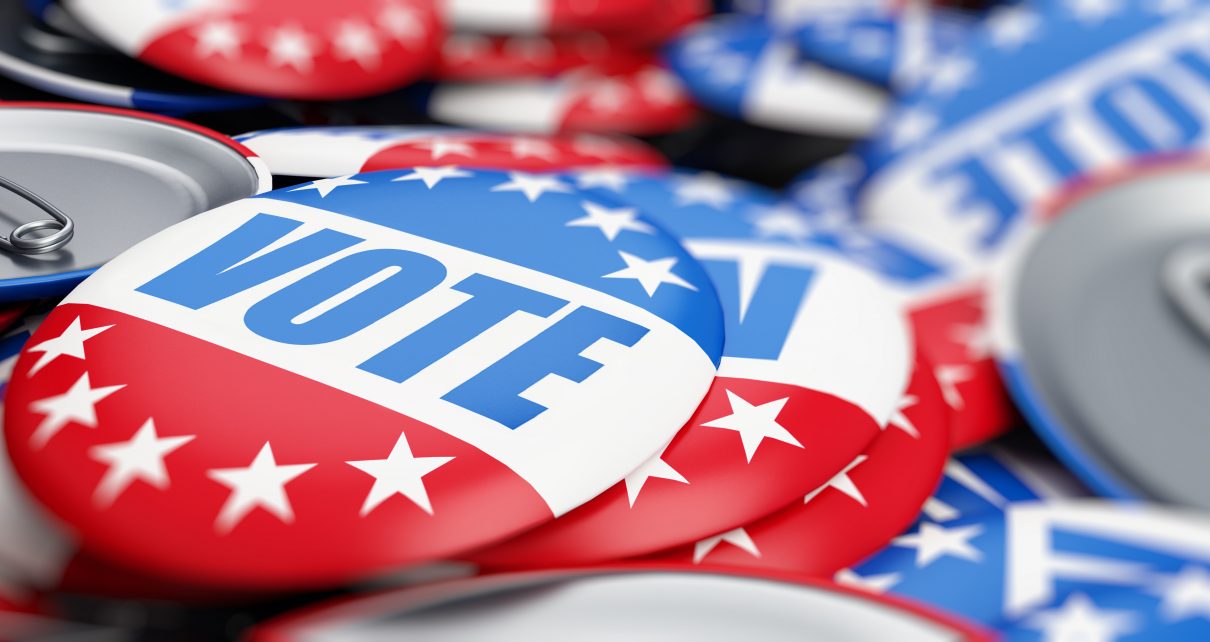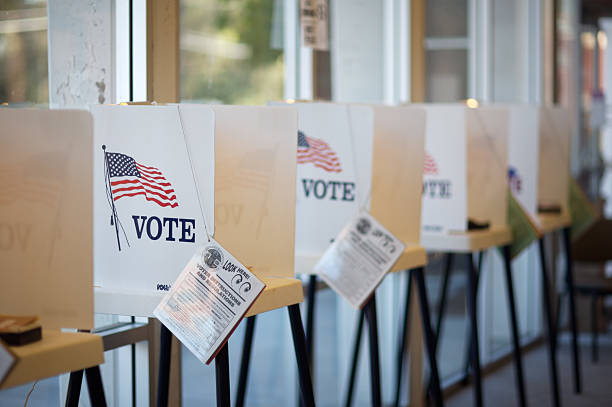
Vote buttons for election. (Photo: 3dfoto/Shutterstock)
OPINION: The Perils Of Ranked Choice Voting
In order for RCV to become law, the ballot question must be passed again when it appears on the 2024 ballot
By Janice Hermsen, October 26, 2023 11:50 am
If you don’t live in Nevada, Alaska, Maine, or parts of California, you probably have not heard of or know much about Ranked Choice Voting (RCV). However, 53 percent of Nevadans voted to implement RCV in the 2022 election by voting “yes” on ballot question 3. In order for RCV to become law, the ballot question must be passed again when it appears on the 2024 ballot.
Democrats, Republicans, progressive and conservative groups have denounced RCV in Nevada. So how did it pass in the 2022 election when Governor Steve Sisolak and Senator Cortez Masto both were against the petition?
That’s a question many Nevadans would like answered.
Presented as the “Better Voting Nevada Initiative“, millions of dollars was spent on outreach through traditional and social media to nudge Nevadan’s into overhauling our election system. Proponents who solicited signatures said it would benefit independent voters by allowing them to vote for anyone in the primary.
Yet, the RCV advocate presenting the scheme to curious voters failed to mention that they would also have to choose from as many as FIVE people running and they must rank each one to have your vote counted! If the voter doesn’t for all five, there is a chance the vote will be discarded.
This is called ballot exhaustion, a concept the founding fathers had no idea would ever appear in a one-person-one-vote Democratic Republic.
Ballot exhaustion occurs when a voter gets to the end election result and a voter either over votes, under votes, or only ranks candidates who have already been eliminated on their ballot per Nevada Policy.
Nevada Policy notes:
Among the problems with RCV is that it theoretically asks all voters to not only research the candidate they favor but every candidate on the ballot and then somehow figure out an order of preference.
Worse still, RCV would apply to U.S. Senate and House elections, along with elections for governor, lieutenant governor, attorney general, secretary of state, treasurer, controller and state legislators. That’s an awful lot of candidates to try and get up to speed on.
And if you make a mistake such as giving the same rank to two candidates, the initiative calls your ballot “inactive” or an “overvote,” and it may be tossed out altogether.
Confusing, right? It’s hard enough to know about one candidate, let alone five. Now a voter needs to know every candidate, whether they are Democrats, Republicans, Independents, or one of the numerous parties available to candidates and voters.
The last Alaska election is a prime example of ballot exhaustion. Kevin Deitrich of Nevada Policy reports:
Consider what happened in Alaska’s special election for its U.S. House of Representatives seat this summer.
Democrat Mary Peltola defeated a field that included Republicans Sarah Palin and Nick Begich III. In the first round, Peltola captured 40 percent of the votes while Palin received 31 percent and Begich took 29 percent.
Those results showed clear support for Republicans, as the two Republican candidates captured 60 percent of the vote between them. But under the new RCV system, Begich was eliminated and his voters’ second choices were redistributed to Peltola and Palin as appropriate.
Palin had more second-place votes than Peltola, but not enough to push her over the majority threshold, as Peltola won, 51.5 percent to 48.5 percent.
“What was important were the 11,000 ballots that went for just Begich and no one else, which is what are termed an exhausted ballot,” Montalbano said. “Those ballots weren’t counted in the final grouping.”
Furthermore, RCV fundamentally changes Nevada’s constitution if the ballot question is approved by a simple majority of voters in 2024.
In 2017, the Maine Supreme Judicial Court, the State’s highest tribunal, found that RCV violates the state constitution.
California Law Review reports:
According to the Nearly 40 state constitutions include provisions similar to that in Maine’s constitution. These provisions declare that candidates are to be elected to office if they receive “a plurality of the votes” or the “highest,” “largest,” or “greatest” number of votes. Maine’s highest court concluded that RCV’s multi-round tabulation process violates this type of provision. Even in states without such a constitutional provision, state statutes often include the same requirement. In short, if the Maine decision is correct and adopted more broadly, it could prevent state and local governments throughout the country from adopting RCV.
I believe many registered independents were misled about the virtues of Ranked Choice Voting. I hope all voters will educate themselves, as I am, and determine that outside forces cannot buy their way into the ballot box and fundamentally change our elections and our constitution.
- OPINION: The Perils Of Ranked Choice Voting - October 26, 2023





Heiress to “shelf stable chili and cheese” …… Dad invented that stuff at the convenience store the you put on your hotdog or nachos…. Daughter spends it on moving politics towards the middle.
Probably close to 80% or more of those asked to sign the petition for Question 3 were misled or had the old bait n switch pulled on them. Nothing was mentioned about Ranked Choice Confusion, just “Open Primaries” which is tantamount to fraud. There’s nothing “free and fair” with Ranked Choice Confusion. There is NO transparency, No way to validate or verify the candidate who the machine says won actually did win. EVERYONE should be against this ridiculous rife with potential fraud question.
It sounds like you didn’t like the results of the new system, so you don’t like the system. Problem is, the people voted as a majority supporting RCV.
Who got the most first place votes? Peltola. If you think that people were really voting for “Republican,” rather than for the candidates, then a traditional FPTP ballot would have revealed its own issues. Spoilering is one of the biggest problems with the FPTP: Palin and Begich likely would have split the Republican vote and both would have lost outright. Palin got plenty of second place votes, which wouldn’t have mattered at all in single vote system. The RCV system actually gave Palin a second chance to win.
I agree it’s a shame that people didn’t choose a second choice candidate, but their first choice was indeed counted and factored in. Should we assume so quickly that all those voters are too confused to vote properly for second place candidate? Maybe they simply didn’t approve of any of the other candidates? In a FPTP their first choice vote would have been the end of it. They had another opportunity to make their voices heard, but if you don’t vote, your voice doesn’t get counted. That’s how it’s always been. RCV works for a number of other countries and locales, I doubt that people in Navada are too stupid to figure it out quickly enough. There’s bound to be growing pains when a system makes improvements, but it doesn’t make sense to say this system is broken after one try. This vote STILL revealed more about the will of the people than a 1-for-1 vote would. Palin now knows to take Begich’s platform more seriously next time. Think about how broken FPTP has proven itself to be in the last 250 years, and think about the what’s best for the next 250.
If you really think the exhausted votes were because of confusion, I’d recommend journalists and candidates use their platforms to educate voters on how the system works. That is, if they think they can really survive in the more cooperative, more productive, less polarized world of RCV.